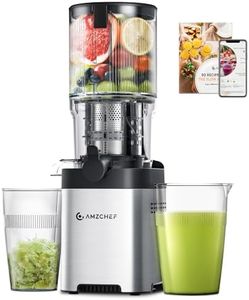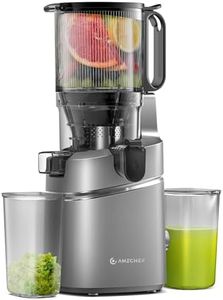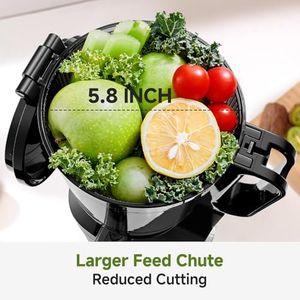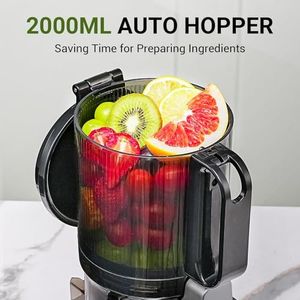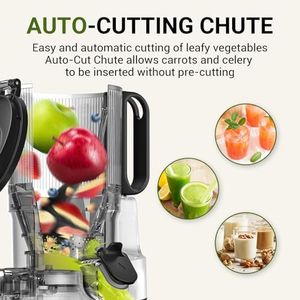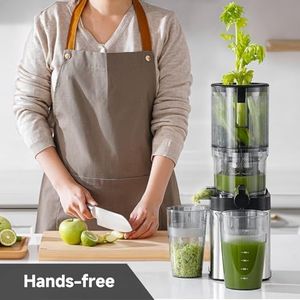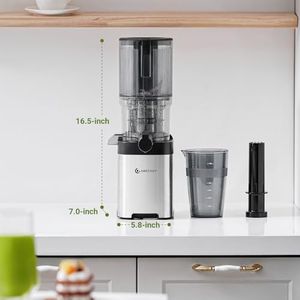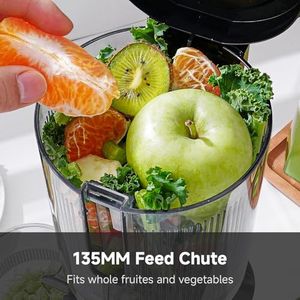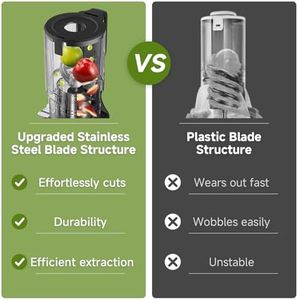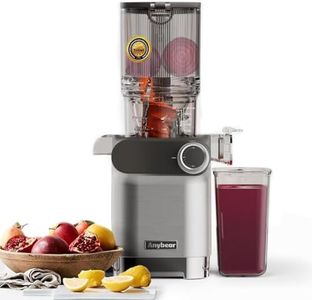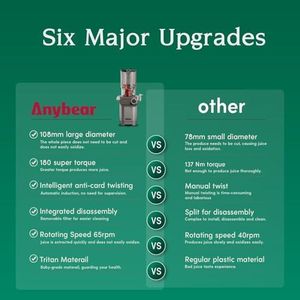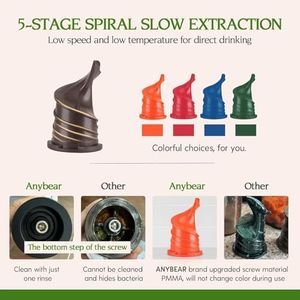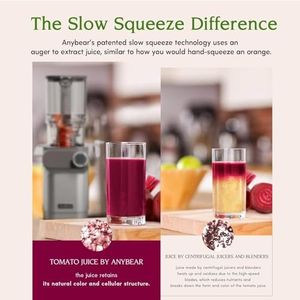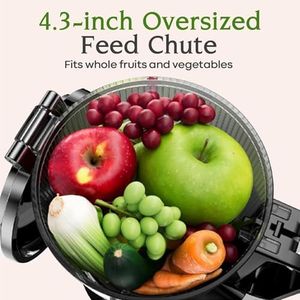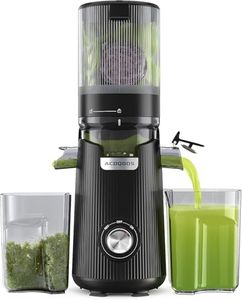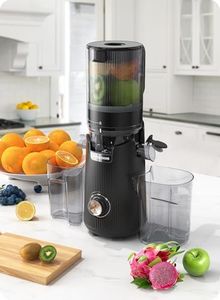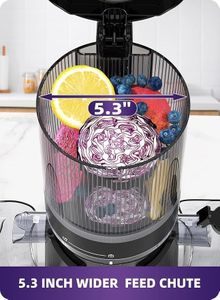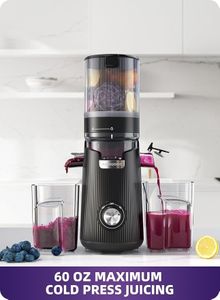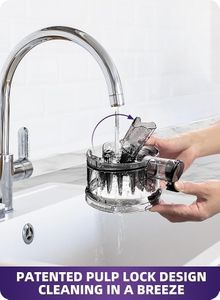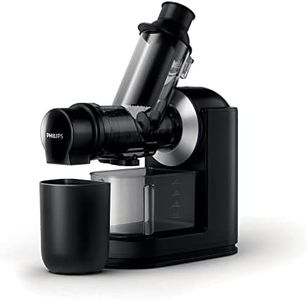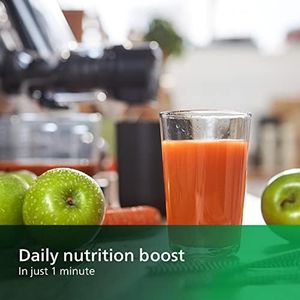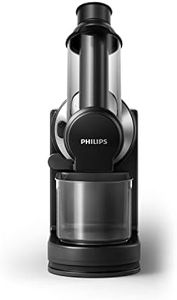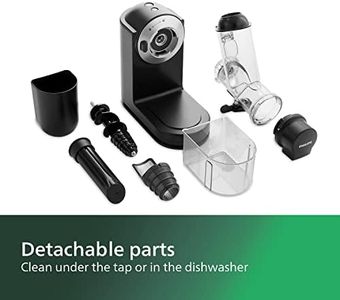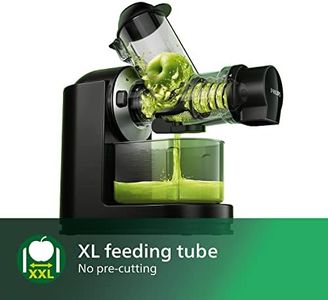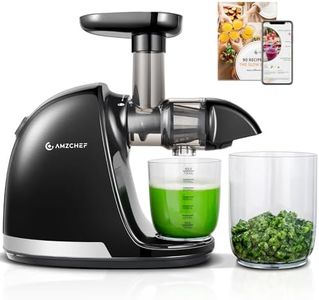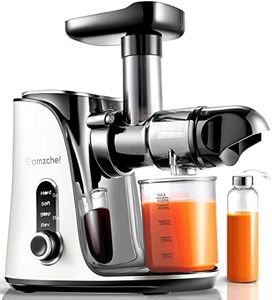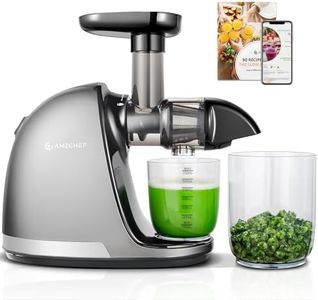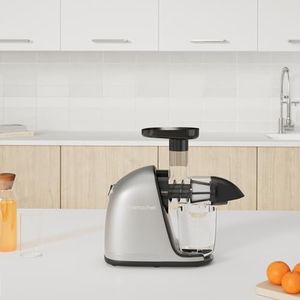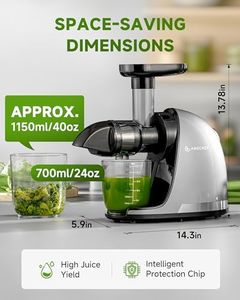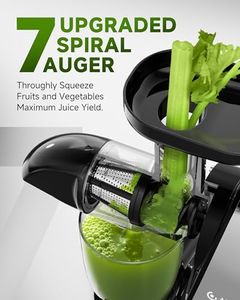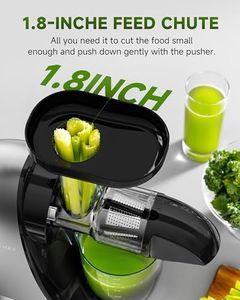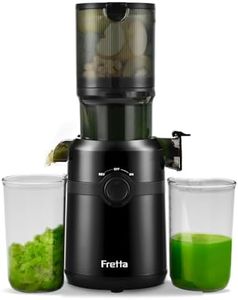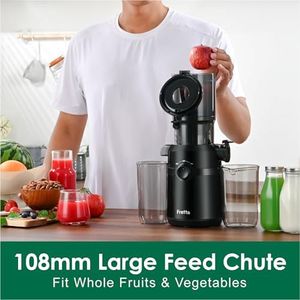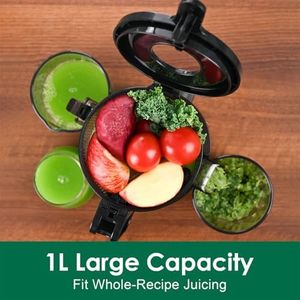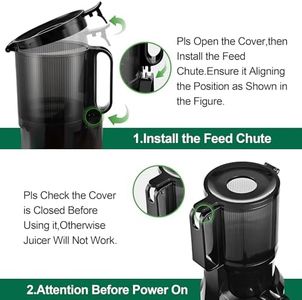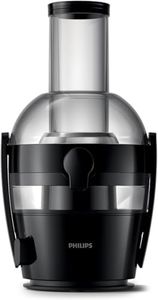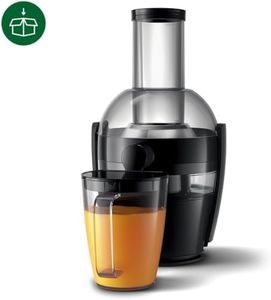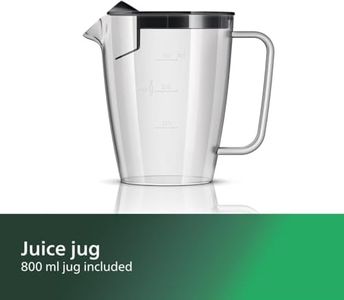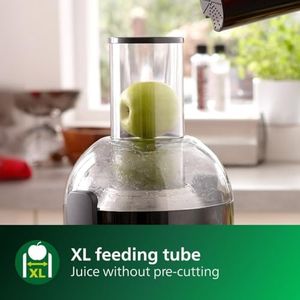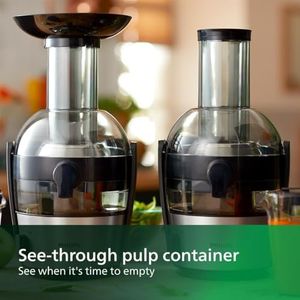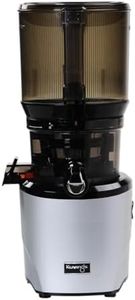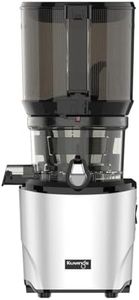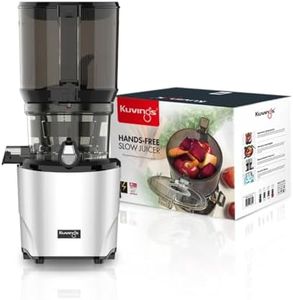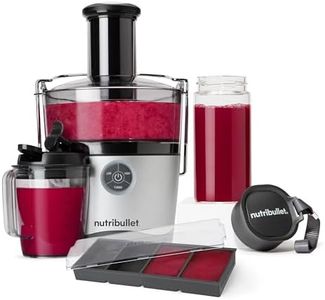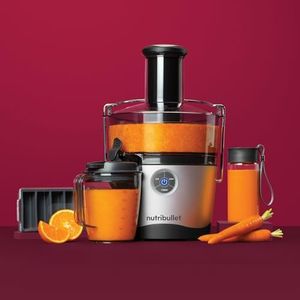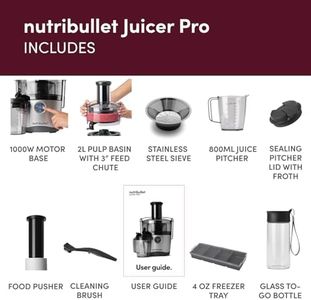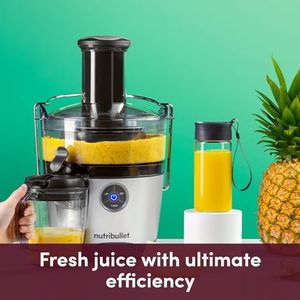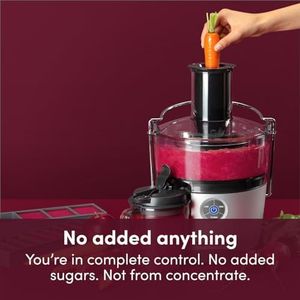We Use CookiesWe use cookies to enhance the security, performance,
functionality and for analytical and promotional activities. By continuing to browse this site you
are agreeing to our privacy policy
10 Best juicer
From leading brands and best sellers available on the web.Top 10 Best juicer 2025 in the UK
#1
Winner
AMZCHEF Automatic Cold Press Juicer Machines 250W Free Your Hands -145MM Opening and 2L Capacity Slow Juicers for Whole Fruit and Vegetable, with Triple Filter, Safety Lock, Classic Grey
AMZCHEF Automatic Cold Press Juicer Machines 250W Free Your Hands -145MM Opening and 2L Capacity Slow Juicers for Whole Fruit and Vegetable, with Triple Filter, Safety Lock, Classic Grey
Type of Juicer: slow masticating
Power: 250W
Juice Yield: triple filter system
Size and Storage: 42 x 22 x 42 cm
Chosen by 1315 this week
AMZCHEF Cold Press Juicer Machines, Slow Juicers with 142 MM Large Feed Chute for Whole Fruit and Vegetable, Durable Stainless Steel Juicer, Auto-cutting Auger, Triple Filter
AMZCHEF Cold Press Juicer Machines, Slow Juicers with 142 MM Large Feed Chute for Whole Fruit and Vegetable, Durable Stainless Steel Juicer, Auto-cutting Auger, Triple Filter
Type of Juicer: Masticating
Power: Copper motor, <60 decibels
Ease of Cleaning: Easier with complex parts
Size and Storage: 18D x 14.7W x 41.5H cm
Anybear Cold Press Juicer, 200W Masticating Slow Juicer 4.3" Large Feed Chute Fit Whole Fruits Vegetables | Upgraded Auger | Tritan Materials | BPA Free | Juice Recipes (Silver)
Anybear Cold Press Juicer, 200W Masticating Slow Juicer 4.3" Large Feed Chute Fit Whole Fruits Vegetables | Upgraded Auger | Tritan Materials | BPA Free | Juice Recipes (Silver)
Type of Juicer: Masticating Slow Cold Press
Power: 200W
Juice Yield: up to 99%
Ease of Cleaning: One-piece steel filter, quick disassembly
Size and Storage: 20x17x39 cm, moderate size
ACOQOOS Juicer Machines, 135MM Wide Chute for Whole Fruit and Vegetable,1.8L Auto-Feed Time-Saver, Slow Masticating High Yield, Easy to Clean Cold Press Juicer with 2 Cups, Black
ACOQOOS Juicer Machines, 135MM Wide Chute for Whole Fruit and Vegetable,1.8L Auto-Feed Time-Saver, Slow Masticating High Yield, Easy to Clean Cold Press Juicer with 2 Cups, Black
Type of Juicer: slow masticating
Power: 300W
Juice Yield: 99%
Ease of Cleaning: Easy to clean
Size and Storage: 38.3D x 32.4W x 18.4H cm
Philips Viva Collection Masticating Juicer, 150W, 1L, XL Tube, Quick Clean Technology, HomeID App, Dishwasher-safe Parts, Drip Stop, Easy Assembly, Compact Storage, Black (HR1889/71)
Philips Viva Collection Masticating Juicer, 150W, 1L, XL Tube, Quick Clean Technology, HomeID App, Dishwasher-safe Parts, Drip Stop, Easy Assembly, Compact Storage, Black (HR1889/71)
Type of Juicer: Masticating Juicer
Power: 150W
Juice Yield: 80%
Ease of Cleaning: QuickClean, dishwasher-safe
Size and Storage: Compact, integrated cord storage
AMZCHEF Juicer Machines - Cold Press Slow Juicer - Masticating Juicer for Whole Fruits and Vegetables - Delicate Chew No Need to Filter - BPA Free Juice Extractor with 2 Cups and Brush - Grey
AMZCHEF Juicer Machines - Cold Press Slow Juicer - Masticating Juicer for Whole Fruits and Vegetables - Delicate Chew No Need to Filter - BPA Free Juice Extractor with 2 Cups and Brush - Grey
Type of Juicer: Masticating
Power: Powerful Motor
Juice Yield: High yield, minimal waste
Ease of Cleaning: Easy to clean, manual effort
Size and Storage: 35x15x34 cm, 2.49 kg
Fretta Cold Press Juicer Machines, Self-Feeding juicer with 108mm&1.0L Feeding Chute for Whole Fruits and Vegetables, Automatic 200W Masticating Juicer, High Yield Juice Extractor, BPA-Free, Black
Fretta Cold Press Juicer Machines, Self-Feeding juicer with 108mm&1.0L Feeding Chute for Whole Fruits and Vegetables, Automatic 200W Masticating Juicer, High Yield Juice Extractor, BPA-Free, Black
Type of Juicer: Slow Masticating Juicer
Power: 200W
Juice Yield: High Juice Yield
Ease of Cleaning: Easy to Clean
Size and Storage: 21 x 18.5 x 33.5 cm, compact
Philips Viva Collection Juicer, 800 W Motor, 2L Capacity, XL Tube, QuickClean Technology, Drip Stop, Pre-clean, See-through Integrated Pulp Container, Black (HR1855/70)
Philips Viva Collection Juicer, 800 W Motor, 2L Capacity, XL Tube, QuickClean Technology, Drip Stop, Pre-clean, See-through Integrated Pulp Container, Black (HR1855/70)
Type of Juicer: centrifugal juicer
Power: 700 watts
Ease of Cleaning: QuickClean tech, dishwasher-safe parts
Size and Storage: compact design
Kuvings AUTO10S Juicer - Easy Care Slow Juicer 3L Capacity & 200W Motor. Ideal for Fruit, Vegetables & Smoothie, Matt Light Silver
Kuvings AUTO10S Juicer - Easy Care Slow Juicer 3L Capacity & 200W Motor. Ideal for Fruit, Vegetables & Smoothie, Matt Light Silver
Type of Juicer: slow juicer
Power: 200W
Juice Yield: 35% more juice, less pulp
Ease of Cleaning: electric brush, multiple tools
Size and Storage: 25.3x21x47.2 cm, 7 kg, tall
#10
nutribullet 1000W Juicer Pro - Large 2L Pulp Basin & 800ml Juice Pitcher - Three Precision Speeds, Wide 3" Chute & Dishwasher Safe - Includes Glass To-Go Bottle 340ml & Freezer Tray
nutribullet 1000W Juicer Pro - Large 2L Pulp Basin & 800ml Juice Pitcher - Three Precision Speeds, Wide 3" Chute & Dishwasher Safe - Includes Glass To-Go Bottle 340ml & Freezer Tray
Type of Juicer: Centrifugal Juicer
Power: 1000W
Size and Storage: 24D x 26W x 41H cm, 6.5 kg
Buying Guide for the Best juicer
Choosing the right juicer can significantly enhance your juicing experience, whether you're a health enthusiast or just someone who enjoys a fresh glass of juice. The key to finding the best juicer for you is understanding the different types of juicers available and what features are most important for your needs. Consider what types of fruits and vegetables you plan to juice, how often you'll use the juicer, and how much time you're willing to spend on cleaning and maintenance. By focusing on these aspects, you can find a juicer that fits seamlessly into your lifestyle.Type of JuicerJuicers generally come in two main types: centrifugal and masticating (also known as slow juicers). Centrifugal juicers are fast and efficient, making them ideal for those who want quick results and plan to juice mostly fruits and soft vegetables. Masticating juicers, on the other hand, operate at a slower speed and are better at extracting juice from leafy greens and wheatgrass, providing a higher yield and preserving more nutrients. If you value speed and convenience, a centrifugal juicer might be the right choice. However, if you prioritize nutrient retention and plan to juice a variety of produce, a masticating juicer could be more suitable.
PowerThe power of a juicer, measured in watts, determines how efficiently it can process different types of produce. Higher wattage typically means the juicer can handle tougher fruits and vegetables with ease. For centrifugal juicers, a power range of 700 to 1000 watts is common, while masticating juicers usually operate at lower wattages, around 150 to 250 watts, due to their slower speed. If you plan to juice hard vegetables like carrots or beets, a higher wattage juicer will be beneficial. For softer produce or leafy greens, a lower wattage masticating juicer will suffice.
Juice YieldJuice yield refers to the amount of juice extracted from a given amount of produce. Masticating juicers generally provide a higher juice yield compared to centrifugal juicers, especially for leafy greens and softer fruits. If maximizing juice output and minimizing waste is important to you, consider a masticating juicer. However, if you are more concerned with speed and convenience, and are okay with slightly less juice yield, a centrifugal juicer might be more appropriate.
Ease of CleaningCleaning a juicer can be a time-consuming task, so it's important to consider how easy it is to disassemble and clean the parts. Some juicers come with dishwasher-safe components, which can save time and effort. Centrifugal juicers typically have fewer parts and are easier to clean, while masticating juicers may require more thorough cleaning due to their complex mechanisms. If you plan to juice frequently, choosing a juicer that is easy to clean will encourage regular use and make the process more enjoyable.
Size and StorageThe size of the juicer is an important consideration, especially if you have limited counter space or plan to store the juicer when not in use. Centrifugal juicers are often more compact and easier to store, while masticating juicers can be bulkier due to their design. Consider the space you have available and how often you plan to use the juicer. If you have ample counter space and plan to juice regularly, a larger masticating juicer might be feasible. For smaller kitchens or occasional use, a compact centrifugal juicer could be more practical.
